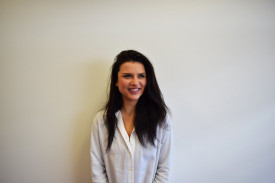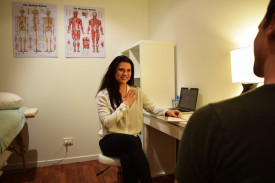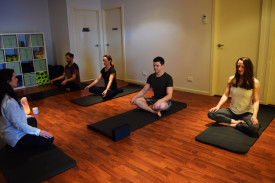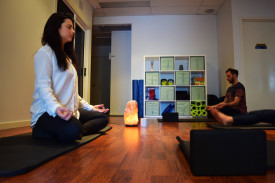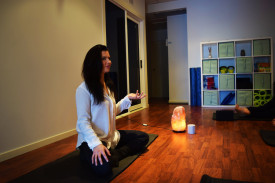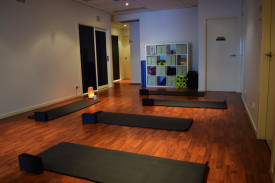18 August, 2017
What inspired you to become a Meditation Teacher?
To be honest, I never really expected or planned to become a Meditation Teacher! It was something that really only came about due to circumstances and external influences in my life – for which I am now so grateful for. Firstly, whilst I was travelling in India in late 2014 completing further yoga studies, I kept hearing about a 10-day silent meditation retreat (a Buddhist tradition known as Vipassana). Wanting to be challenged and to deepen my own meditation practice at that point, I immediately signed up for the next one and jumped on a 22-hour bus ride to Pushkar, India (22 hours on a bus - never again!). The course fundamentally changed my perspective of and personal relationship to meditation, and I experienced first-hand what a transformational practice it can be.
Following this, I suffered some chronic neck and back pain, and soon became unable to do and/or teach Vinyasa Yoga (a flowing, quite active style of yoga). Whilst initially it seemed as if my greatest passion was being taken away from me, and I experienced a lot of sadness and resistance, over time I started to focus on what I COULD do rather than what I couldn’t, and looked to other ways that I could look after myself and feel connected to my body and breath. I started meditating twice daily and noticed the most incredible shifts in my daily life. And here we are! Just over a year later and I am only falling more in love with meditation, and exploring more and more how incredibly therapeutic and powerfully healing it is.
What inspired you to study Psychology?
When I started University, I was studying Biomedicine, and planned to continue on to graduate Medicine. However, the more biology/anatomy/physiology based the subjects became, the less engaged I found myself! On the other hand, in my breadth subjects I had chosen all Psychology subjects, and was desperate to learn more and more! I stuck with Bio-med for a few years, however it became more and more clear that my passion was more in the workings of the mind and how and why different individuals experience mental health difficulties, than it was in the systems of the body and physical illness.
Looking back, from a young age I knew I wanted to help people, and growing up with doctor parents, I simply assumed that the trajectory I was on was medicine. But I think in starting out on a different route, I got to experience that powerful U-turn moment where you realize what your true calling is, and from there can make a shift in your life. I was often the person that people would come to with their problems. I love people, I love learning about theories of the mind and what makes us how we are, and I am constantly curious about other people’s inner experiences – it seems so obvious now! But things always make sense in retrospect, I guess.
How does your study in Psychology help you as a Meditation Teacher?
I think having the knowledge and experience in psychology and the field of mental health can be helpful, and at times crucial, in teaching meditation. For example, it is helpful to know the biological, neurobiological, cognitive etc. processes and pathways involved and the changes that can occur with regular meditation. This would allow the practitioner to educate clients on the benefits and outcomes, as well as mean the teacher could tailor the meditation to suit an individual’s needs more specifically. A mental health background is extremely important when teaching those who have experienced any sort of trauma, are impacted by depression or anxiety, or live with chronic pain, for example. If not taught in an informed way, meditation can be anxiety-provoking and even re-traumatizing for some individuals.
How would you describe your teaching style?
My teaching style is invitational – everything I say is an offering. I like to give students options, as there is no one size fits all approach. For me, a big part of meditation is the establishment of equanimity and a feeling of centred-ness – so the energy I try to impart to the room is calm, supportive and balanced.
What activities do you enjoy?
So many things! For most of my life, sport and movement has been huge – be it running, netball, volleyball, swimming, yoga, etc. I am nursing a bit of an injury currently, however, and as such I have been finding pleasure in cooking nourishing meals, curling up with a book, going on day-trips and to the movies! My movement-based activities have had to shift, and I now adore clinical pilates, walking, dancing and yin yoga.
What motivates you to get out of bed every morning?
Ever since I was young, I have bounced out of bed in the mornings. I love getting up early, before the sun has risen, and experiencing the transition from dark to light: it’s almost like the world is waking up, and with it there’s this brand new beginning. Every morning I get up and have a big drink of water, meditate, and then go for a walk on the Merri Creek Trail near my home. It is having this routine, this ritual, that I do every morning that really grounds me, and gets me out of bed every day.
If you were stuck on a remote island, what three things would you bring with you?
Oh, great question! Such a tough one. Can I take my boyfriend? He’d be so much more savvy than me! No, no. I take that back – I don’t need him! I would take…
Coconut oil (sooooo many uses!);
A really big thick book - something like Infinite Jest, to really keep me going;
You haven’t told me the climate of the island, but I get cold very easily, so I’m thinking a really fluffy doona might be a necessity. And if it’s hot, I’ll just sell it…or something…right? Oh, wait. It’s a remote island….I’m not very good at this.
What is your favourite way to relax (other than meditation)?
Going for a big walk after a long day is something that always helps me to unwind mentally. If I am physically tired, then I’ll get straight into bed with some tea and raw chocolate and watch a movie or a TV series on my laptop.
What are your own health goals and how do you balance this with work and other responsibilities?
I always try to make my health – physical, mental and spiritual – a priority. Of course, at times life can be overwhelming, and we need to be a bit flexible, but in general I find a way to ensure I am doing my best to nourish my body with nutrient-dense foods, carving space in my days for things like meditation, or reflective practices, and ensuring I do things that I enjoy and see people that lift me up.
My physical health goals these days actually involve taking a step back, and being a bit gentler with myself and my body, and to not put myself under the subconscious pressure that is often attached to striving toward goals (especially if you are the kind of person, as I am, who sets pretty high standards). I am working on a little more acceptance and gratitude of things as they are, and a little less wanting to change things.
What are your own health goals and how do you balance this with work and other responsibilities?
I always try to make my health – physical, mental and spiritual – a priority. Of course, at times life can be overwhelming, and we need to be a bit flexible, but in general I find a way to ensure I am doing my best to nourish my body with nutrient-dense foods, carving space in my days for things like meditation, or reflective practices, and ensuring I do things that I enjoy and see people that lift me up.
My physical health goals these days actually involve taking a step back, and being a bit gentler with myself and my body, and to not put myself under the subconscious pressure that is often attached to striving toward goals (especially if you are the kind of person, as I am, who sets pretty high standards). I am working on a little more acceptance and gratitude of things as they are, and a little less wanting to change things.
Appointments available in Moonee Ponds or online.


